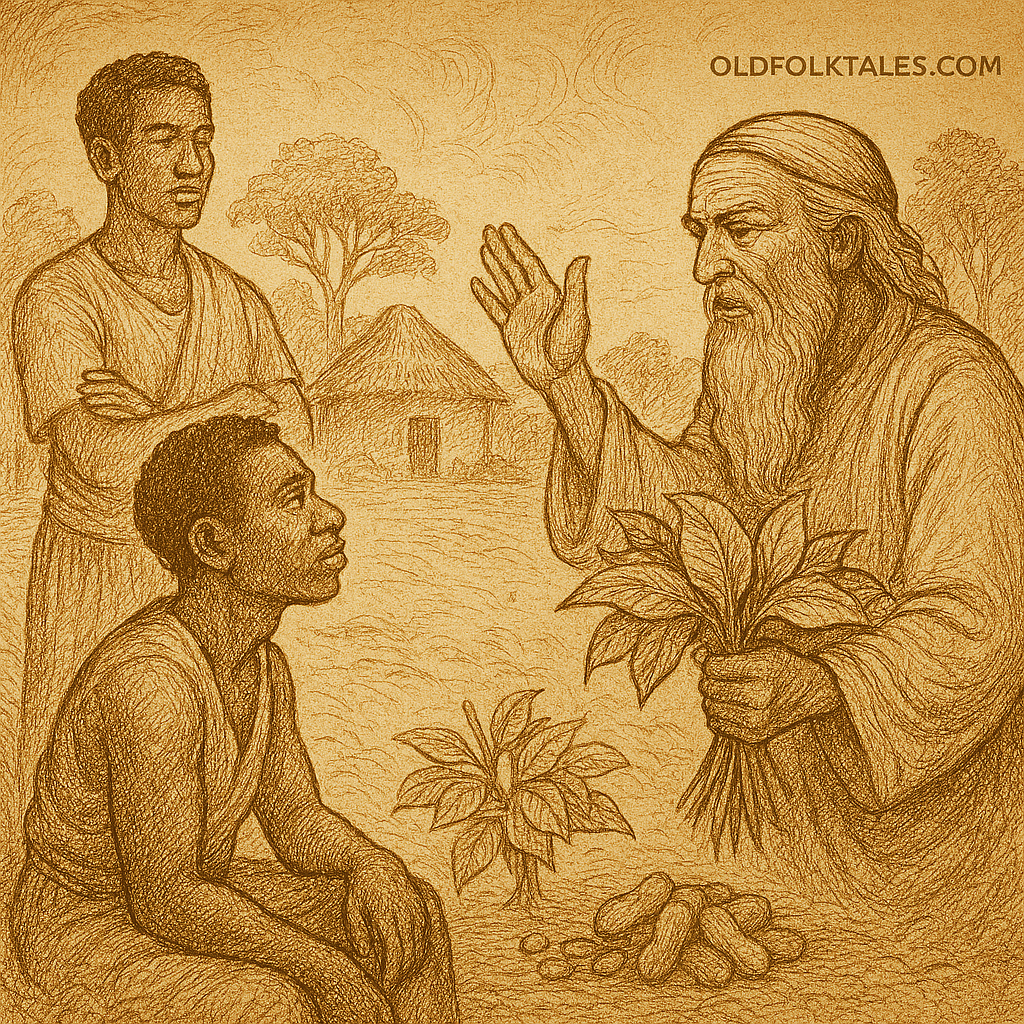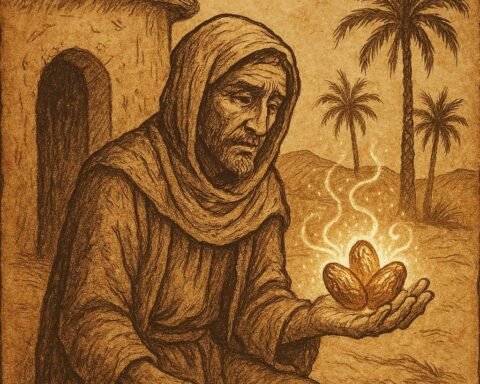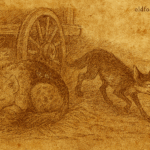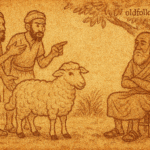In the verdant hills of ancient Cameroon, where the morning mist clung to emerald valleys and the sacred baobab trees stretched their mighty arms toward the heavens, there stood the prosperous village of Isangele. This was no ordinary settlement, for it was blessed with something rarer than gold or ivory, a leader whose reputation for wisdom had spread like ripples across the waters of distant rivers, reaching kingdoms far beyond the boundaries of his own domain.
The chief of Isangele was not a man who commanded attention through physical prowess or material wealth. His frame was neither imposing nor adorned with elaborate ceremonial dress. His voice carried no thunderous boom that could silence a crowd through sheer volume. Yet when he spoke, even the chattering children would pause their games, and the market women would set down their wares to listen. For this was the man they called simply “The Wise Chief,” and his words carried the weight of truth itself.
His compound was built in the traditional style, with walls of red clay brick that had been smoothed by skilled hands and roofs of woven palm fronds that rustled gently in the warm African breeze. But it was not the architecture that drew visitors from across the land, it was the open courtyard where justice was dispensed with a fairness that had become legendary throughout the region.
Also read: Why There Are Different Races on Earth
Every morning, as the golden sun painted the sky in shades of amber and rose, the people of Isangele would gather beneath the great shade tree that dominated the chief’s courtyard. Some came with disputes that had festered like untreated wounds, others with grievances that had grown bitter through sleepless nights of worry. All came seeking the wisdom that flowed from their leader like clear water from a mountain spring.
On one particular morning, when the air was heavy with the promise of afternoon rain, two men approached the chief’s presence with faces flushed red with anger and voices raised in heated accusation. Between them, they dragged a brown goat whose bleating protests echoed across the courtyard, drawing curious glances from the assembled villagers.
“Great Chief!” the first man called out, his chest heaving with indignation. “This goat belongs to me! I raised it from a kid, fed it with my own hands, and built shelter for it with my own labor!”
“Lies!” shouted the second man, his eyes blazing with equal fury. “This animal has lived in my compound for two full seasons! Every morning I have given it water, every evening I have led it to graze! How can this man claim what is clearly mine?”
The gathered villagers began to murmur among themselves, their voices rising like the buzz of busy bees as they debated the merits of each claim. Some nodded in agreement with the first man, others found themselves swayed by the passion in the second man’s voice. The tension in the courtyard grew thick as storm clouds, threatening to erupt into the kind of chaos that could tear a community apart.
Through all this commotion, the Wise Chief sat motionless on his carved wooden stool, his weathered hands resting calmly on his knees, his deep brown eyes reflecting the serene patience of one who had witnessed countless such disputes. His face showed neither hurry nor judgment, only the quiet contemplation of a man who understood that truth, like cream, would eventually rise to the surface if given time and proper conditions.
When the shouting finally subsided and expectant silence fell over the courtyard like a gentle blanket, the chief raised one hand in a gesture so subtle yet commanding that every eye turned toward him with reverent attention.
“My brothers,” he said, his voice carrying the melodic cadence of one accustomed to being heard and heeded, “you both speak with the passion of men who believe deeply in their cause. Your words are strong, your arguments compelling. But truth is not always found in the loudest voice or the most eloquent speech.”
The chief rose slowly from his seat and walked to where a clay water pot sat in the shade of the courthouse. The villagers watched in fascination as he poured clear water into a wooden bowl, then methodically washed his hands with the deliberate care of one performing a sacred ritual. Every movement was purposeful, every gesture measured, as if he were preparing not just his hands but his very spirit for the task ahead.
“Tomorrow,” he announced, his voice carrying easily across the hushed courtyard, “when the sun reaches its highest point in the sky, we shall discover whose goat this truly is. Each of you must return to your own compound and gather the food with which you normally feed this animal. Bring it here, and we shall see which offering the goat accepts with joy.”
The next day dawned bright and clear, with the kind of crystalline African sunlight that made every leaf and blade of grass sparkle like precious jewels. The entire village seemed to hold its breath as the appointed hour approached, and when the two disputants arrived at the chief’s courtyard, they carried with them not just their offerings but the hopes and curiosities of their neighbors.
The first man stepped forward with obvious confidence, bearing a bundle of fresh cassava leaves that he had clearly selected with great care. The green foliage was perfect young, tender, and obviously nutritious. He placed his offering before the goat with ceremonious pride, certain that his claim would be vindicated.
But the goat, after sniffing delicately at the cassava leaves, turned its head away with what could only be described as disinterest, even disdain. The first man’s confident expression crumbled like dried clay, and confused murmurs rippled through the watching crowd.
The second man then approached, carrying what appeared to be a much less impressive offering, simple palm fronds and vegetable peelings that looked almost humble in comparison to the first man’s pristine cassava leaves. Yet the moment these familiar scraps were placed before the animal, the goat’s entire demeanor transformed. It rushed forward with eager bleating, its tail wagging with unmistakable joy as it devoured the modest feast.
Laughter erupted from the gathered villagers not mocking laughter, but the delighted recognition of truth revealed through divine wisdom. Even the first man, despite his disappointment, found himself smiling at the elegant simplicity of the chief’s solution.
“You see,” the Wise Chief said, his eyes twinkling with gentle satisfaction, “the goat itself has spoken more clearly than any human tongue could do. Truth needs no elaborate arguments or passionate speeches. It reveals itself to those who have patience to observe and wisdom to listen.”
The first man bowed his head in acknowledgment of both his error and the chief’s wisdom, while the second man gratefully led his rightful property home, his step lighter and his heart full of appreciation for justice fairly dispensed.
But the chief’s reputation for wisdom was built on more than clever solutions to property disputes. Not long after the goat incident, a poor widow appeared in his courtyard, her eyes red with tears of desperation and her thin shoulders shaking with sobs that seemed to rise from the very depths of her soul.
“Great Chief,” she pleaded, her voice breaking with emotion, “I am lost, and my children will soon starve. My neighbor, who has more land than he could farm in ten lifetimes, has taken the small plot that feeds my family. Now I have nothing no crops to harvest, no hope for tomorrow.”
Her neighbor, a prosperous man whose wealth was evident in his fine clothes and well-fed appearance, stood beside her with arms crossed and expression set in lines of stubborn arrogance.
“Chief,” he said with the dismissive tone of one accustomed to having his way, “surely you will not take the word of this poor woman over mine. I am a respected member of this community, a man of substance and standing. Who would believe her claims against someone of my position?”
The Wise Chief studied both faces carefully, reading the desperate honesty in the widow’s tear-stained features and the calculated confidence in the rich man’s bearing. Without a word, he rose from his seat and gestured for both parties to follow him.
The small procession made its way through the village and out into the surrounding farmland, where the disputed plot lay under the warm African sun. The chief walked slowly around the perimeter of the field, his experienced eyes taking in every detail of the soil, the remnants of previous crops, and the subtle signs that only one who truly understood the land could interpret.
Finally, he bent down and gathered a handful of the rich, dark earth in his weathered palm. He held it up to catch the sunlight, examining it with the reverence of one who understood that soil was the foundation of all life and prosperity.
“Tell me, my sister,” he said gently to the widow, “what grows in this earth?”
Her answer came immediately, spoken with the intimate knowledge of one who had worked this land with her own hands: “Yams and groundnuts, Great Chief. They are humble crops, but they are the food that keeps poor families alive through the long dry season.”
The chief then turned to the wealthy man, the handful of soil still cradled in his palm. “And you, my brother, what grows here in your opinion?”
The rich man shrugged with casual indifference, his gesture betraying a complete lack of connection to the land he claimed to own. “Nothing of particular importance,” he replied dismissively. “Just the usual things that poor people plant.”
Without another word, the Wise Chief opened his hand and let the precious soil fall through his fingers, returning to the earth from which it came. His action was more eloquent than any lengthy speech could have been.
“This land,” he announced with quiet authority, “belongs to the one who knows its gifts and treasures its bounty, not to the one who dismisses its value. The earth itself has testified. Return this plot to the widow, for she alone understands what it truly offers.”
The assembled villagers burst into spontaneous cheers and applause, their voices raised in celebration of justice served and wisdom displayed. The rich man, his arrogance deflated like a punctured water skin, lowered his head in shame and silently walked away, while the widow fell to her knees in grateful prayer.
Under the benevolent leadership of the Wise Chief of Isangele, the village flourished like a garden tended by loving hands. Thieves found no welcome in a place where justice was swift and certain. Those who would spread lies discovered that truth had powerful protection in their community. The vulnerable and defenseless knew they could find shelter under the chief’s fair judgment, while the honest and hardworking prospered under his encouragement.
Word of his wisdom traveled along the ancient trade routes like seeds carried on the wind. Merchants would make detours to pass through Isangele, hoping to witness the legendary chief’s court in session. Other leaders journeyed from distant kingdoms to observe his methods and perhaps learn the secret of his success.
“Let us see this chief who judges with the wisdom of the ancestors,” they would say to one another as they planned their pilgrimages. “Perhaps we can discover how he brings such peace and prosperity to his people.”
Years passed, and seasons turned like the great wheel of time, but the chief’s reputation only grew brighter with age. Even after his earthly body had returned to the soil he had loved and served so well, his name continued to live in the stories told around evening fires, in the songs sung by traveling griots, and in the hearts of all who had witnessed true leadership in action.
The Moral Lesson
This profound Cameroon folktale teaches us that true wisdom lies not in displaying power or wealth, but in patient observation, careful listening, and the ability to let truth reveal itself naturally. The Wise Chief of Isangele demonstrates that effective leadership comes from understanding people’s hearts and motivations rather than simply enforcing rules through authority. His story shows that justice is best served when we create conditions that allow truth to emerge organically, and that the greatest leaders are those who serve their people with humility, fairness, and genuine care for the welfare of all community members, regardless of their social status.
Knowledge Check
Q1: What made the Chief of Isangele famous throughout Cameroon in this folktale? A: The Chief of Isangele was famous for his exceptional wisdom and fair judgment, not for physical strength or wealth. People traveled from far away to witness his court sessions because his decisions were always just and his words carried truth, earning him the title “The Wise Chief.”
Q2: How did the Wise Chief solve the goat ownership dispute in this Cameroon story? A: The Wise Chief solved the goat dispute by having each claimant bring food they normally used to feed the animal. The goat eagerly ate the palm fronds and peelings from the second man but rejected the cassava leaves from the first man, proving who the true owner was through the animal’s natural recognition.
Q3: What land dispute did the Wise Chief resolve using soil as evidence in this African folktale? A: The chief resolved a dispute between a poor widow and a wealthy man over farmland. He took both to the field, gathered soil in his hand, and asked what grew there. The widow knew it grew yams and groundnuts (food for poor families), while the rich man dismissively said “nothing important,” revealing who truly valued and worked the land.
Q4: What leadership qualities does the Wise Chief of Isangele represent in this Cameroon folktale? A: The Wise Chief represents patient listening, careful observation, fairness regardless of social status, humility despite authority, and the wisdom to let truth reveal itself naturally rather than making hasty judgments. He shows that true leadership serves the community’s welfare over personal power.
Q5: How did the Wise Chief’s leadership transform Isangele village according to this African story? A: Under the Wise Chief’s leadership, Isangele prospered as thieves feared to steal, liars feared to speak, and the weak found protection. The village became so renowned for justice that travelers from distant lands came to witness his court sessions and learn from his wisdom.
Q6: What does this Cameroon folktale teach about justice and truth in African traditional values? A: This folktale teaches that justice comes through patient wisdom rather than loud arguments or social status, that truth reveals itself naturally when given proper conditions, and that effective leaders must serve all people fairly while respecting the inherent wisdom found in observing natural signs and human behavior.
Source: Cameroon folktale, as retold from Shadows in the Firelight






